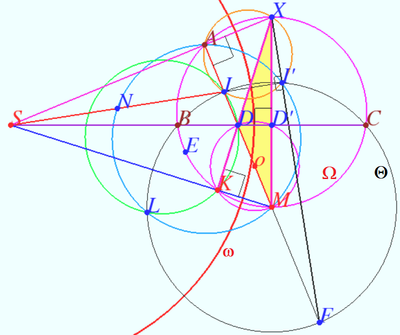Difference between revisions of "2017 USAMO Problems/Problem 3"
(→Solution) |
(→Solution) |
||
| Line 3: | Line 3: | ||
==Solution== | ==Solution== | ||
| + | [[File:2017 USAMO 3.png|400px|right]] | ||
Let <math>X</math> be the point on circle <math>\Omega</math> opposite <math>M \implies \angle MAX = 90^\circ, BC \perp XM.</math> | Let <math>X</math> be the point on circle <math>\Omega</math> opposite <math>M \implies \angle MAX = 90^\circ, BC \perp XM.</math> | ||
| Line 11: | Line 12: | ||
<math>S</math> is the orthocenter of <math>\triangle DMX \implies</math> the points <math>X, A,</math> and <math>S</math> are collinear. | <math>S</math> is the orthocenter of <math>\triangle DMX \implies</math> the points <math>X, A,</math> and <math>S</math> are collinear. | ||
| − | Let <math>\omega</math> be the circle centered at <math>S</math> with radius <math>R = \sqrt {SK \cdot SM} | + | Let <math>\omega</math> be the circle centered at <math>S</math> with radius <math>R = \sqrt {SK \cdot SM}.</math> |
| − | Note that the circle <math>\Omega</math> has diameter <math> | + | We denote <math>I_\omega</math> inversion with respect to <math>\omega.</math> |
| + | |||
| + | Note that the circle <math>\Omega</math> has diameter <math>MX</math> and contain points <math>A, B, C,</math> and <math>K.</math> | ||
<math>I_\omega (K) = M \implies</math> circle <math>\Omega \perp \omega \implies C = I_\omega (B), X = I_\omega (A).</math> | <math>I_\omega (K) = M \implies</math> circle <math>\Omega \perp \omega \implies C = I_\omega (B), X = I_\omega (A).</math> | ||
Revision as of 03:24, 21 September 2022
Problem
Let ![]() be a scalene triangle with circumcircle
be a scalene triangle with circumcircle ![]() and incenter
and incenter ![]() Ray
Ray ![]() meets
meets ![]() at
at ![]() and
and ![]() again at
again at ![]() the circle with diameter
the circle with diameter ![]() cuts
cuts ![]() again at
again at ![]() Lines
Lines ![]() and
and ![]() meet at
meet at ![]() and
and ![]() is the midpoint of
is the midpoint of ![]() The circumcircles of
The circumcircles of ![]() and
and ![]() intersect at points
intersect at points ![]() and
and ![]() Prove that
Prove that ![]() passes through the midpoint of either
passes through the midpoint of either ![]() or
or ![]()
Solution
Let ![]() be the point on circle
be the point on circle ![]() opposite
opposite ![]()
![]() the points
the points ![]() and
and ![]() are collinear.
are collinear.
Let ![]()
![]() is the orthocenter of
is the orthocenter of ![]() the points
the points ![]() and
and ![]() are collinear.
are collinear.
Let ![]() be the circle centered at
be the circle centered at ![]() with radius
with radius ![]()
We denote ![]() inversion with respect to
inversion with respect to ![]()
Note that the circle ![]() has diameter
has diameter ![]() and contain points
and contain points ![]() and
and ![]()
![]() circle
circle ![]()
![]() circle
circle ![]() is cyclic
is cyclic ![]() the points
the points ![]() and
and ![]() are collinear.
are collinear.
Let ![]() It is well known that
It is well known that ![]() is circle centered at
is circle centered at ![]()
Let ![]()
![]() is cyclic.
is cyclic.
![]() the points
the points ![]() and
and ![]() are collinear.
are collinear.
![]() is cyclic
is cyclic ![]()
![]() is cyclic.
Therefore point
is cyclic.
Therefore point ![]() lies on
lies on ![]()
In ![]()
![]() is orthocenter of
is orthocenter of ![]()
![]() is midpoint
is midpoint ![]() is midpoint
is midpoint ![]() is orthocenter of
is orthocenter of ![]() is root of height
is root of height ![]() circle
circle ![]() is the nine-point circle of
is the nine-point circle of ![]() lies on circle
lies on circle ![]()
Let ![]()
![]() is cyclic.
is cyclic.
![]() the points
the points ![]() and
and ![]() are collinear.
are collinear.
Point ![]() is orthocenter
is orthocenter ![]() the points
the points ![]() and
and ![]() are collinear.
are collinear.
![]() is cyclic.
is cyclic.
Contact
Contact v_Enhance at https://www.facebook.com/v.Enhance.










